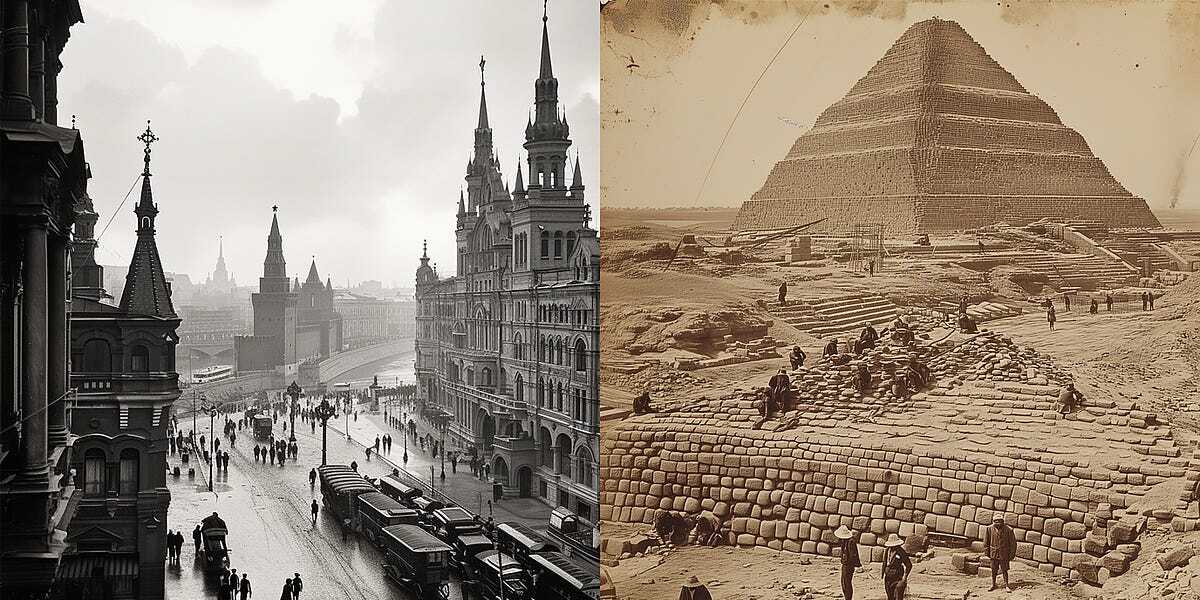It was ever thus:
A lie gets halfway around the world before the truth has a chance to get its pants on.
Winston Churchill
I don’t dare to ask why your truth has been naked before…
Because the truth fucks, homie.
And trust me, these generated images are getting scarily good.
I have to agree, I would not be able to spot a single one of them as fake. They look really convincingly authentic IMO.
Stalin famously ordered people he had killed erased from photos.

Imagine what current and future autocratic regimes will be able to achieve when they want to rewrite their histories.
Stalin famously ordered people he had killed erased from photos.
This checks out, here’s an article about it: https://www.history.com/news/josef-stalin-great-purge-photo-retouching
So why are you downvoted? Maybe because your view is too optimistic? And the problem isn’t only with autocratic regimes. But much more general.
How do we validate anything, when everything can be easily faked?Probably just because some people really like Stalin, and have become convinced his accounts are the truthful ones and everyone else lies about him.
That’s a scary thought!! But all kinds of crazy exist, and I mean people have to be literally crazy to want to live under a regime like Stalin made.
“Photoshopping” something bad existed for a long time at this point.AI generated images doesn’t really change anything other then the entire photo being fake instead of just a small section.
It changes a lot. Good Photoshopping skills would not create the images as shown in the article.
The easy and speed with which AI created photos, of a quality most photoshoppers could only dream, can be created of does very much change everything.
Like 1984.
Honestly, it looks like the picture on the left is fake, like the guy was inserted into it. Just look at his outline, compared with the rest of the background.
(I’m no Stalin fan, just commenting on the picture itself.)
We’ll now need AIs to spot AI fakes. AI wins!
The problem is that it’s a constant war between fake generators and fake detection algorithms. Sort of a digital version of bacteria out-evolving antibiotics.
And for a reasonable price, the AI corporations will sell you the chance to survive in the world they created for you.
Check out Adobe’s Content Authentication Initiative. It won’t prevent those images but it will allow you to verify their source, which in this case should not authenticate.
The past we know is a carefully crafted and curated story and not at all accurate as it is. It is valuable to learn and understand but also be skeptical. I don’t really think wide spread forgery changes that. Historiography is a very important field.
Any serious historical research will have to verify the physical copies exist or existed in a documented way to be admitted as evidence. This is called chain of custody and is already required.
AI is creating fake XY, and that is problems, problems, problems everywhere…
During the last decades, IT guys and scientists have always dreamed about using AI for good things. But now AI has become so much better at creating fake things than good things :-(
People created fake photoshop images long before AI…
It’s not really a new problem, people were doing it with their imaginations and stories long before AI came around. The tools of the digital age simply amplified the effect. Healthy skepticism is still the solution, that hasn’t changed.
It’ll never actually go away, though. Of all the possibile ways of looking at any given situation, the vast majority will always be inaccurate. Fiction simply outnumbers nonfiction. Wrong answers outnumber correct answers.
So, the adjustment has to be inside of us, and again, it’s always been necessary. This isn’t fundamentally new.
The new thing is the scope in which fake content is being created. In a very near future most internet content will be fake, including history. That is not something that has happened before in history.
The current AI situation is completely unprecedented in history.
I would disagree. I think if we go back even a few centuries, we find that virtually nobody had a firm grasp on historical fact, due to the printing press not being invented yet, alongside archeological techniques not existing.
I mean, maybe it has happened before in history, but someone changed it via AI and we just don’t know…
From the article…
The real danger lies in those images that are crafted with the explicit intention of deceiving people — the ones that are so convincingly realistic that they could easily pass for authentic historical photographs.
Fundamentally/meta level, the issue is one of is; are people allowed to deceive other people by using AI to do so?
Should all realistic AI generated things be labeled as such?
So AI really is a seminal paradigm-changing technology. For the worse.
Automatic spam generator.
For the worse.
Not necessarily.
But we’re going to have to deal with the basic issue of deceiving someone with AI, and if any AI generated thing should be labeled or not as such.
Basically, a legislative fix, and not just a free market free for all.
How do you enforce labelling when there will never be a way to reliably test if something was ai generated?
Basic is not a word that fits the situation.
How do you enforce labelling when there will never be a way to reliably test if something was ai generated?
If the icon is not there and then it’s determined that it’s AI generated, as it was with that British royal family picture the other day; crowd sourced.
I am not understanding you. Or perhaps you’re not understanding me.
Firstly, the British royal family photo was not ai generated.
If you can’t find a way to test if something is ai generated, who decides what is or isn’t ai generated?
When I read the title I sarcastically thought “Oh no, why is AI deciding to create fake historical photos? Is this the first stage of the robot apocalypse?” I find the title mildly annoying because it putting the blame on the tool and ignoring that people are using it to do bad things. I find a lot of discussions about AI do this. It is like people want to avoid that it is how people are using and training the tool is the issue.
Isn’t the tool part of the issue? If you sell bomb-making parts to someone who then blows up a preschool with them, aren’t you in some way culpable for giving them the tool to do it? Even if you only intended it to be used in limestone quarries?
That really depends on whether the bomb making part is specific to bombs, and if their purchase of that item could be considered legitimately suspicious. Many over the counter products have the potential to be turned into bombs with enough time or effort.
If a murderer uses a hammer, do you think the hardware store they purchased the hammer from should be liable?
You can make crude chemical weapons by mixing bleach with other household items. Should the supermarket be liable for people who use their products in ways they never intended?
Exactly this, many times over.
Most tools with legitimate uses also have unethical uses.
Everything needed to make a bomb can be found at your local Walmart. Nobody blames the gas companies when something gets molotoved.
Compare to the “Cottingley Fairies” photographs of 1917.
I just listened to the Criminal podcast on that, recently. Fascinating cultural moment.
@[email protected] draw for me a fake historical photo.
Can AI write car service manuals that are only slightly incorrect?
Does that AI think that Indian people are monkeys or something case there is a photo there where it clearly made their face look more inline with a monkey
Digital documents NFT is the solution that comes to my mind for the upcoming massive chaos of AI generated digital material.
What a techbro take.
That’s only a solution if everyone adopts it. Which I doubt will happen on social media.










